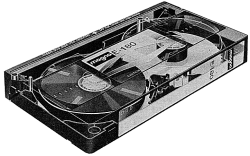(According to the history pages on Sony's own website, many of the technical details of VHS were copied
-- they would use the word stolen -- from Betamax. Sony shared the details of their technology while attempting
to convince the others to back Beta, and were appalled by the similarities when they saw the VHS system. I'm sure
JVC would see things differently, of course...)
A PAL version of VHS reached the UK in 1978, about a month earlier than Betamax. By this time, VHS could
boast three-hour tapes; this was possible partly because VHS cassettes were larger, and could therefore hold more
tape, but also because of the lower "recording density" of VHS's less demanding performance. Sony had developed
their machines from professional systems, and had concentrated on quality, while JVC designed a system which was
the minimum acceptable to home users. This philosophy was extended to the VHS machines, which were generally
simpler and hence cheaper to make.
A combination of cheapness, playing time and easy rental, plus a greater choice of pre-recorded tapes,
eventually saw VHS the victor in the Format War. The format also went on to spawn several sub-formats - the
miniature VHS-C in 1984, and the high-band SVHS in 1988. |
